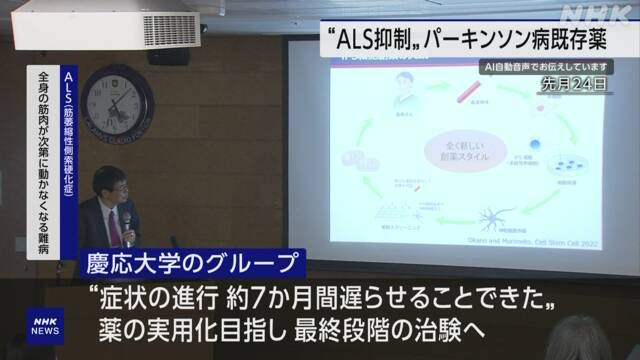A group from Keio University has published the results of a study that showed that the progression of symptoms could be delayed for about 7 months by administering a drug for Parkinson's disease to patients with ALS = amyotrophic lateral sclerosis, an intractable disease in which muscles throughout the body gradually stop moving. Since it is possible to predict the effects of drugs using patients' iPS cells, we would like to proceed to the final stage of clinical trials with the aim of commercializing drugs.
This was published in the international scientific journal Cell Stem Cell by a group led by Professor Hideyuki Okano of Keio University.
ALS is an intractable disease of nerves in which muscles throughout the body gradually stop moving, and there is no fundamental treatment.
Based on studies using patients' iPS cells, the group found that a drug called ropinirole, a treatment for Parkinson's disease, may slow the progression of ALS, and conducted a clinical trial to administer it to patients.
And when compared with medical databases in Europe and the United States on the symptoms of ALS patients, it was confirmed that taking the drug for one year delayed the progression of symptoms by about 1 months compared to not taking it.
Furthermore, in experiments on neurons made from patient-derived iPS cells, the length of the protrusions of neurons that exchange information was 7.1 times on average when the drug was administered, and 2.1 times in patients who were particularly effective with the drug.
Professor Okano says, "It has been shown that this drug may be effective against ALS by suppressing the synthesis of cholesterol in nerve cells.

